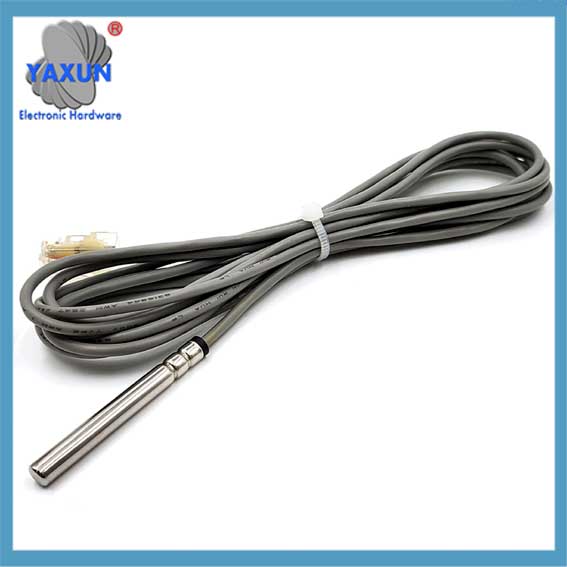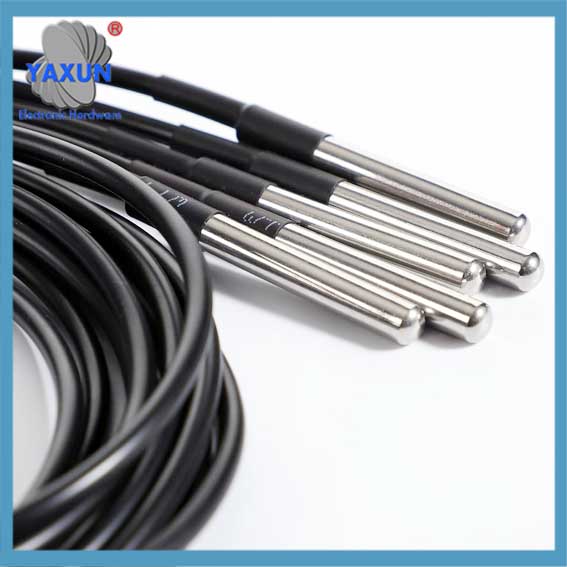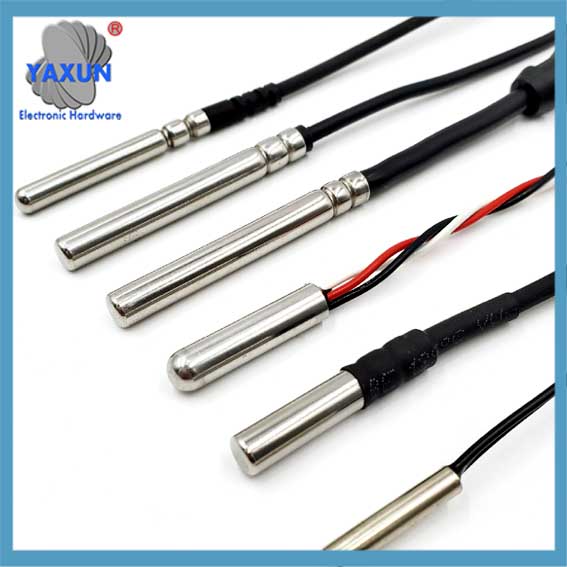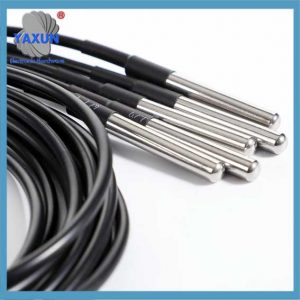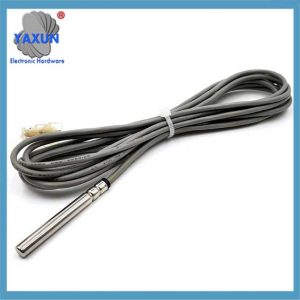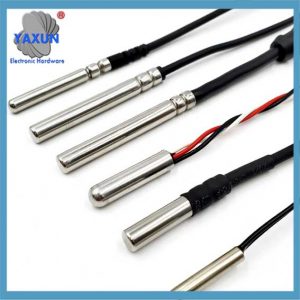catégories de produits
- Disjoncteur thermique 20
- Porte-boîte à fusibles 36
- Capteur de température 67
- Interrupteur thermique 64
- Fusible de voiture 19
- Fusibles boulonnés 7
- fusion thermique 32
- fusibles à montage en surface 12
- thermistance 22
- Porte-fusible à montage sur circuit imprimé 27
- Faisceau de câblage 6
- Porte-fusibles à lame 17
- thermostat 46
- Fusible électrique 14
Mots clés du produit
Messages récents
Sonde de capteur de température numérique DS18B20 – Programmable
This is custom 1-wired and waterproofed version of the DS18B20 sensor. Handy for when you need to measure something far away, or in wet conditions. The temperature sensor supports the “1-Fil” interface (1-Fil), and the measurement temperature range is -55℃~+125℃.
This is custom 1-wired and waterproofed version of the DS18B20 sensor. Handy for when you need to measure something far away, or in wet conditions. Using the digital temperature sensor DS18B20 from Dallas Semiconductor and the high thermal conductivity sealant potting, the temperature sensor is highly sensitive and has a small temperature delay. The temperature sensor supports the “1-Fil” interface (1-Fil), and the measurement temperature range is -55℃~+125℃. In the range of -10℃~+85℃, the accuracy is plus or minus 0.5 degré Celsius. The field temperature is directly transmitted in a digital way of “1-Fil”, ce qui améliore considérablement la capacité anti-interférence du système. They work great with any microcontroller using a single digital pin, and you can even connect multiple ones to the same pin, each one has a unique 64-bit ID burned in at the factory to differentiate them. Usable with 3.0-5.0V systems.
It is suitable for field temperature measurement in harsh environments. DS18B20 digital temperature sensors all have unique numbers, and the temperature acquisition equipment uses the number to identify the corresponding temperature sensor.
The only downside is they use the Dallas 1-Wire protocol, which is somewhat complex, and requires a bunch of code to parse out the communication.
We toss in a 4.7k resistor, which is required as a pullup from the DATA to VCC line when using the sensor. We don’t have a detailed tutorial up yet but you can get started by using the Dallas Temperature Control Arduino library which requires also the OneWire Library.
Cable specs:
Stainless steel tube 6mm diameter by 30mm long
Cable is 36″ long / 91cm, 4mm diameter
Contains DS18B20 temperature sensor
If your sensor has four wires – Red connects to 3-5V, Black connects to ground and White is data. The copper wire is soldered to the wire shielding
If your sensor has three wires – Red connects to 3-5V, Blue/Black connects to ground and Yellow/White is data
DS18B20 Technical specs:
Usable temperature range: -55 à 125°C (-67°F à +257°F)
9 à 12 résolution sélectionnable en bits
Uses 1-Wire interface- requires only one digital pin for communication
Unique 64 bit ID burned into chip
Multiple sensors can share one pin
±0.5°C Accuracy from -10°C to +85°C
Temperature-limit alarm system
Query time is less than 750ms
Usable with 3.0V to 5.5V power/data
Caractéristiques:
·High-quality stainless steel tube packaging, imperméable, moisture-proof and rust-proof
·Stainless steel head lead length 1 meter, steel tube 6*50mm (lead length is 1 meter, 2 meters and 3 meters in stock, peut être personnalisé en fonction des besoins)
·Each probe is individually packaged after strict testing
·3.0V~5.5V power supply
·9~12-bit adjustable resolution
·Wide temperature sensing range -55℃ ~ +125℃ (lead can only withstand a temperature of about 85 degrés)
No external components are required, unique single bus interface
···DS18B20’s sealing glue is hard glue, and the wire is pure copper lead (not aluminum-plated copper);
The probe uses an imported DS18B20 temperature sensor chip, and each pin of the chip is separated by a heat shrink tube to prevent short circuits, and the internal sealing glue is waterproof and moisture-proof.
Contactez-nous
En attente de votre email, nous vous répondrons dans les 12 heures avec des informations précieuses dont vous aviez besoin.
 English
English العربية
العربية Български
Български 粤语
粤语 中文(简体)
中文(简体) 中文(漢字)
中文(漢字) Nederlands
Nederlands Suomi
Suomi Français
Français Deutsch
Deutsch Ελληνικά
Ελληνικά Magyar
Magyar Italiano
Italiano 日本語
日本語 한국어
한국어 Polski
Polski Português
Português Română
Română Русский
Русский Slovenščina
Slovenščina Español
Español Svenska
Svenska ภาษาไทย
ภาษาไทย Türkçe
Türkçe Tiếng Việt
Tiếng Việt
